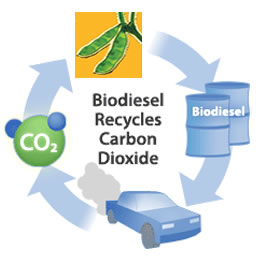What Is Biodiesel?
Q: What is Biodiesel?
A: Biodiesel is the name of a clean burning alternative fuel, produced from domestic, renewable resources.

Biodiesel contains no petroleum, but it can be blended at any level with petroleum diesel to create a biodiesel blend. It can be used in compression-ignition (diesel) engines with little or no modifications. Biodiesel is simple to use, biodegradable, nontoxic, and essentially free of sulfur and aromatics.
Q: Is Biodiesel the same thing as raw vegetable oil?
A: No! Biodiesel is produced from any fat or oil such as soybean oil, through a refinery process called transesterification. This process is a reaction of the oil with an alcohol to remove the glycerin, which is a by-product of biodiesel production. Fuel-grade biodiesel must be produced to strict industry specifications (ASTM D6751) in order to insure proper performance. Biodiesel is the only alternative fuel to have fully completed the health effects testing requirements of the 1990 Clean Air Act Amendments. Biodiesel that meets ASTM D6751 and is legally registered with the Environmental Protection Agency is a legal motor fuel for sale and distribution. Raw vegetable oil cannot meet biodiesel fuel specifications, it is not registered with the EPA, and it is not a legal motor fuel.










